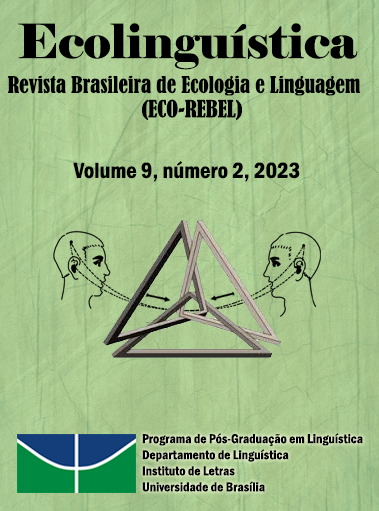Mariana e Brumadinho: vozes de vítimas e justiça no desastre ambiental de Minas Gerais
Keywords:
Ecolingusitica; Rompimento das barragens de Mariana e Brumadinho; Stories; partnership.Abstract
Os estudos sobre as relações entre língua e ecologia levaram a atenção para os efeitos do agir humano sobre o sistema do qual a vida depende através da identificação de discursos e visões do mundo incluídas no uso da língua juntamente com seus impactos na biodiversidade. Seguindo essa perspectiva, esse artigo trata de discursos sobre os desabamentos das barragens de Mariana e Brumadinho com o objetivo de acessar e analisar a narrativa dos eventos na perspectiva das vítimas, a reapresentação de vítima e a construção de justiça como discurso. Baseado na junção de prospectivas interdisciplinares de Ecolinguística, Ecocrítica e Partnership Studies, a análise baseia-se nos instrumentos metodológicos para a identificação de discursos e debates sobre stories (STIBBE, 2021). Parte-se também de uma Ecosofia fundada nos princípios de cuidado, partnership, proteção e justiça (EISLER, 1988, 2018; EISLER, FRY, 2019).
Downloads
Downloads
Published
How to Cite
Issue
Section
License

This work is licensed under a Creative Commons Attribution-NonCommercial-NoDerivatives 4.0 International License.
Authors who publish in this journal agree to the following terms:
Authors retain copyright and grant the journal the right of first publication. The work is simultaneously licensed under the Creative Commons Attribution License allowing the sharing of the work with acknowledgment of the authorship of the work and initial publication in this journal.
Authors are authorized to enter into additional contracts separately for non-exclusive distribution of the version of the work published in this journal (e.g., publishing in institutional repositories or as book chapters), with acknowledgment of authorship and initial publication in this journal.
Authors are allowed and encouraged to post and distribute their work online (e.g., in institutional repositories or on their personal page) at any point before or during the editorial process, as this can bring about productive revisions as well as increase impact.
Citation of published works (See The Effect of Free Access).



3.png)



